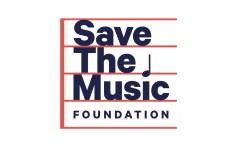Business News
Page: 8

Trending on Billboard
Shortly after Paramount began pulling back its funding for Save the Music, which has donated instruments and tech equipment worth nearly $78 million to 2,800 U.S. schools, John Sykes held a Rock & Roll Hall of Fame board meeting in spring 2024. “This is the perfect fit for what we’re doing,” he told the group. “We have this huge, powerful platform, with some of the greatest artists in the world that we could put out there, going to schools, preaching the importance of music education.”
Beginning with a $1 million grant, and the promise of Hall of Fame inductees like Sheryl Crow and pop stars like Harry Styles and Olivia Rodrigo talking to students at schools around the U.S., the Hall of Fame announced a partnership with Save the Music on Tuesday (Oct. 28) to help fund Save the Music’s dozens of programs. “We hope the politicians and the local governments will hear about this story and find out why music education must stay, or must be reconnected with a public education,” says Sykes, the Hall of Fame’s foundation chairman, a top executive at broadcast giant iHeartMedia and an MTV co-founder who created Save the Music in 1997.
Related
Save the Music was once synonymous with VH1, where Sykes was president, and major stars like Aretha Franklin, Whitney Houston and Mariah Carey headlined charity performances broadcast live on the powerful cable-music channel. But in recent years, Paramount has deemphasized its MTV and VH1 holdings, ramping down on its Save the Music support in the process. As a result, Save the Music has spent the last few years turning to other sources, including TikTok, Meta, Amazon and top promoters Live Nation and AEG Presents. In 2021, MacKenzie Scott, co-founder of Amazon and Jeff Bezos‘ ex-wife, provided a $2 million grant.
“As Paramount’s support gradually came down,” says Henry Donahue, the Save the Music Foundation’s longtime executive director, “we were very fortunate that a number of large foundations came in to fill the gap and actually grow the program.”
Save the Music, whose operating budget was $11 million last year, supports high-school students with initiatives like the J Dilla Music Technology Grant, named for the late hip-hop producer, which provides music-tech equipment and software for students and teachers. “The program is extremely valuable to students,” Samuel Davis, a Therrell High School teacher whose Atlanta classroom benefited from the grant, told the AP in January. “It increases their attendance. They’re more willing to come to school. They feel more connected to the school.”
Related
Sykes created Save the Music after participating in a principal-for-a-day event at a New York high school, where he encountered music students playing instruments “held together with tape and missing strings,” he recalls. He offered $5,000 on behalf of VH1 to prevent the school from cutting the music program, then decided to expand the channel’s philanthropy after learning that “students who learn music education go on to do better on math and verbal scores on tests.”
Today, Save the Music invests in 100 to 150 U.S. music programs, drawing celebrity support from Ed Sheeran, Jelly Roll and others who’ve donated time and money. The Cleveland-based Hall of Fame, according to Sykes, has music-education programs, but the partnership with Save the Music will take them to “a whole new level.” Says Donahue: “It’s an incredible boost.”
Trending on Billboard Amsterdam Dance Event (ADE) took place in the Dutch capital last week (Oct. 22-26), with the city’s vibrant dance and electronic scene taking over bars, clubs and venues for a week of performances, panels and professional networking. It’s not an overstatement to suggest that the city, a diverse and fun-loving hub of […]
Trending on Billboard
From tour sponsorships to Taco Bell commercials featuring Turnstile, major companies see billion-dollar branding opportunities in partnering with artists, and a new study from Luminate has some matchmaking suggestions.
The industry-leading music analytics platform looked at five years’ worth of survey results and metrics measuring likability, awareness and brand endorsement to determine the best artists to market sodas, snack foods, cosmetics and credit cards. “Cultural capital isn’t something brands should tap into retroactively,” the report authors write. “Behavioral audience entertainment data can inform marketers, helping them to locate artists whose fan base matches a brand’s target audience. Think of it as ‘moneyball’ for brand partnerships.”
Related
Luminate has collected quarterly online survey results from a representative slice of U.S. consumers, ages 13 and up, since 2021. It identified super-purchasers of food & beverage, personal care & hygiene, travel, telecom, mobile apps and banking & finance products, and analyzed the survey results and other metrics to understand their attitudes and perceptions toward some 600 artists and 100 music genres and sub-genres.
The study deliberately stayed away from megastars like Taylor Swift and instead identified artists who may be less well known, but who among certain groups are well-liked and trusted, and therefore could provide brands with a better return on their marketing dollars, says Grant Gregory, a researcher and manager at Insights at Luminate.
“The decision-making process was a mix of identifying artists with high likability AND artists who are uniquely appealing (in terms of likability) or have uniquely high reach (in terms of awareness) among that category purchasing group vs. the general population,” says Gregory.
The artists who scored among the highest in each consumer category were: country crossover star Bailey Zimmerman for food and beverage products, the queen of regional Mexican music Ana Bárbara for personal care & hygiene products, rising country star Lainey Wilson for banking and finance, Bebe Rexha for telecom, Jamaican singer and rapper Shenseea for service and e-commerce apps such as ride hailing and food delivery and electronic artist Kenya Grace for travel.
Here are some of the highlights from the report.
Bailey Zimmerman
The study plotted the “Fall in Love” singer’s likability and brand endorsement scores from survey respondents who bought at least three packaged snacks, coffee or other food products recently. Zimmerman outscored JENNIE, Leon Thomas, Dolly Parton and Queen as a good bet for marketers. While Chris Stapleton had the highest awareness score, Zimmerman won on likability. His fans tend to be younger and more affluent than the overall population and are more likely to listen to music at least twice a week on Apple Music and Spotify.
“Zimmerman presents a narrower but deeper fandom among category buyers,” Luminate’s authors found, while “Stapleton offers a broader though still highly efficient fandom.”
Ana Bárbara
The longtime grupero singer/songwriter Bárbara beat Young Miko, Arya Starr and Dolly Parton when it came to her strength as a personal care product brand endorser, with only Parton beating her on likability. Bárbara scored particularly well in awareness, perhaps due to the current popularity of regional Mexican music. She over-indexes with Millennial, Gen X and even Gen Z consumers, and fan devotion is particularly strong. Those audiences are more likely than most to use social media apps, including TikTok and Instagram.
Lainey Wilson
Wilson falls in the middle of a pack of superstars that includes Stevie Nicks and Kelly Clarkson, who both rank slightly ahead of Wilson on awareness. However, Clarkson ranks high on awareness and public perception but in the average range for fan engagement metrics. Wilson ranked among the highest for likability and purchase likelihood.
Wilson’s fans also tend to have higher-than-average income, with 38% earning more than $75,000 a year, compared to the general population, and more than three-quarters of the banking and financial product consumers surveyed said they would be more likely to buy a product she endorsed, the report found.
Bebe Rexha
“Recognizable, out-of-the-limelight performers such as Bebe Rexha can still shine through in the data,” Luminate’s report found. The Brooklyn born “Meant To Be” singer has had four top 10 songs on the Billboard Hot 100, and her audience tends to skew young, with roughly two-thirds being from the Gen Z and Millennial generations. This audience is more likely than the general audience to use a streaming service like Amazon Prime Video, Netflix or HBO Max at least weekly, and 60% reported they would use a telecom product if she endorsed it. Among the general population, 42% said they would try a telecom product Rexha endorsed.
Shenseea
The Jamaican dancehall singer/rapper is among the best artists to market to a mobile app like Seamless, Uber or Airbnb, Luminate found. While Leon Thomas and Adele ranked slightly higher on likability scores among mobile app super-consumers — defined as people who use two or more mobile apps for services, such as food delivery or ride-hailing — 78% of those consumers who are aware of Shenseea said they would try an app if she endorsed it. That group tends to be more racially diverse, come from the Millennial and Gen X generations and they’re active across social media platforms, the report found.
Kenya Grace
The South African-born British electronic music singer Kenya Grace ranked is less well-known than Shenseea, Lola Young or Riley Green, but Luminate found that her U.S. audience looks a lot like the people travel companies want to target. Their annual incomes are more likely than most to be middle-to-high, with 61% making more than $50,000 annually, compared to less than half of the general population, and Grace’s audience frequently uses video streaming services like Disney+ or YouTube –appealing places for travel companies to advertise.
Trending on Billboard
Recently-launched music company By Design, co-founded and led by music execs Josh Bailey, Jeremy Holley, Rod Riley and Josh Thompson, has partnered with BMG. The new partnership is set to include global distribution, label services, joint label signings and a co-investment strategy that will reach across catalog acquisitions through Archetype Music (a music rights holding company acquiring faith-based music rights).
By Design’s roster currently includes country singer-songwriter Frankie Ballard, as well as pop-folk singer-songwriter Zoe Levert and singer-songwriter Alex Jude. The label is also part of a larger company ecosystem, which includes Archetype Music, and nonprofit organization Blueprint, which aims to equip and empower faith-based creators.
Related
“Faith-driven music has long been of particular interest to many members of the BMG team,” Jon Loba, President of Frontline Recordings, BMG Americas, said in a statement. “Even though we have not specifically engaged in that line of business, there has always been the desire and intention to do so. The opportunity to partner with By Design offered the perfect, complimentary alliance with exceptional, proven industry executives, who have the same heart and artist-first approach to music as BMG. We are so incredibly excited to join forces with Rod, Jeremy, both Josh’s and the entire By Design team, to enter a global genre that is one of the most powerful cultural forces rising today.” “We partnered with BMG to scale purpose-driven music without compromising values,” Thompson said. “Their global reach empowers us to honor each artist’s original design – and share it on a global stage.” “We believe the next global movement in music will be rooted in faith and community, not algorithms and trends,” Bailey added. “With BMG’s international infrastructure and our shared commitment to empowering artists, we’re building a new kind of platform, one that’s both spiritually grounded and globally scaled.”
Related
“By Design exists to champion the creators behind this movement, artists who carry purpose in their message and originality into a culture hungry for meaning,” Holley added.
By Design’s launch comes as the Contemporary Christian Music (CCM) genre has seen a surge. Earlier this year, two CCM songs made simultaneous appearances on Billboard’s all-genre Hot 100, marking the first time two CCM songs have reached that mark simultaneously in 11 years. Those songs were Forrest Frank’s “Your Way’s Better” and the Brandon Lake-Jelly Roll collaboration “Hard Fought Hallelujah.” Earlier this month, Phil Wickham also made his Hot 100 chart debut with the song “What An Awesome God.”
Trending on Billboard
“I hope you feel so proud, and I’m sure you might feel a little scared, too,” said Maggie Rogers as she gave a wisdom-filled commencement address in May at Radio City Music Hall to New York University’s Tisch School of the Arts class of 2025 — the school from which Rogers graduated in 2016.
“A lot of speakers might tell you that they remember how you feel,” Rogers added. “But I was sitting where you were sitting just nine years ago, so when I tell you that, I promise that I mean it.”
Nine years ago, Rogers also appeared in Billboard for the first time, on the opening page of the 2016 Top Music Business Schools list. She was shown in a photograph with Pharrell Williams, whose astounded reaction to her self-released track “Alaska” went viral on YouTube and ignited her career straight out of the Tisch School’s Clive Davis Institute of Recorded Music.
Related
For more than a decade, Billboard has been spotlighting schools that are educating the next generation of music industry leaders, as well as the artists and producers who recognize the importance of the business skills that these schools teach.
Billboard chooses its top music business schools based on industry recommendations, alum information provided by honorees from our multiple power lists, years of reporting on educational options and information requested from the schools themselves. We invite selected schools to tell us what makes their program unique, to boast about accomplished alums and to describe specific courses, events and speakers. (This year, the Liverpool Institute for Performing Arts claims the coolest campus visit, as LIPA founder Paul McCartney hosted Bruce Springsteen, who took part in an hourlong Q&A session with students in June.)
The schools here are not ranked; they are listed alphabetically. “Rankings have created an unhealthy obsession with selectivity,” former U.S. Secretary of Education Miguel Cardona said in a 2023 speech. Despite moves to downsize the U.S. Department of Education, that federal agency still hosts a free, online college scorecard that provides quantitative information to complement the qualitative profiles on our list, including specific data on college costs, graduation rates, employment and student debt.
Acknowledging college costs and debt, Billboard has opted to emphasize more affordable public colleges and universities, which now make up one-third of this list. We also continue to recognize historically Black colleges and universities such as Howard University and Tennessee State University and to add schools from outside the music industry’s capitals, such as the newly included University of Georgia in Athens.
What Rogers said she would have told her younger self upon graduating nine years ago certainly also applies to those now searching for schools to start their music careers — on or off the stage.
“I’d remind her that two artistic careers will never be the same and that numbers do not matter — what matters is how you make people feel,” Rogers said. “I’d tell her that the people you do this with — and how you define what it means to live a beautiful life — matter more than anything. The world is waiting for you and all of the beautiful things you will create.”
Abbey Road InstituteLondon
The Abbey Road Institute offers its students an intensive music production and sound engineering diploma, which, as closely as possible, replicates the experience of working in the music and audio industry. The school prepares graduates to build their careers as professionals in music and pro audio. Its core program is the Advanced Diploma in Music Production and Sound Engineering, which includes an in-depth music business module that covers management, A&R, marketing, synch, licensing and much more. The new Dolby Atmos Mixing for Music course is taught by Grammy Award-winning engineer James Auwarter. More than 90% of graduates are in music- and audio-related work within six months of graduation. The institute now has affiliated programs worldwide and is on track to open campuses in Mumbai, India, and Los Angeles.
Alum: Producer-engineer-mixer Gil Portal at RAK Studios, whose credits include work with Disclosure, Coldplay, Shaznay Lewis, J Balvin, Usher and DJ Khaled.
American UniversityWashington, D.C.
Housed within American University’s Kogod School of Business, the Business and Entertainment Program offers a core business background while students specialize in the entertainment industry with classes primarily taught by industry veterans. Kogod added a focus on artificial intelligence to every class this year, and many speakers at the fourth annual Artist Rights Symposium — including SAG-AFTRA general counsel Jeff Bennett — addressed topics surrounding AI and name, image and likeness rights. Each year, students head to New York and Los Angeles to visit business management firms, agencies and other entertainment companies. On campus, recent speakers include Lionsgate chairman/chief creative officer Kevin Beggs, Academy Award winner David Dinerstein and Kogod alums working at Live Nation, United Entertainment Group Worldwide, CAA and the three major music groups. Recent graduate placements include eight students hired at business management firm FBMM and 12 students hired at major agencies.
Faculty: New program director Linda Bloss-Baum also teaches a class where students attend SXSW and the National Independent Venue Association conference and help promote a showcase.
Auburn UniversityAuburn, Ala.
Auburn’s Department of Music established a music business minor in 2023, and the late-2024 completion of a state-of-the-art recording studio located within the Music Studies complex is the latest enhancement to the Music Studies Program, which offers courses taught by instructors with real-world experience. Students are introduced to all aspects of the music business, from labels and publishers to touring and concert promotion, with an emphasis on a global/entrepreneurial perspective. Speakers including Universal Music Publishing Nashville CEO Troy Tomlinson and former Warner Music Nashville A&R executive vp Scott Hendricks keep the conversation fresh. While the Music Business Program is relatively new, Auburn University grads include Apple CEO Tim Cook and executives working at companies such as WME, Sony, The Trenches Collective, Sun Records and Sweet Talk Publicity.
Course: Record Company Procedures gives students the experience of working for a record company by forming a label, working with an artist from a designated artist pool and creating a marketing, sales and media plan all while staying within a designated budget.
Baldwin Wallace UniversityBerea, Ohio
Located just 15 minutes from Downtown Cleveland, Baldwin Wallace offers a bachelor of arts in music industry and, in 2021, was invited to become an educational affiliate of the Grammy Museum. Last fall, music industry students had the opportunity to attend the Disney+ live production of the induction ceremony at the Rock & Roll Hall of Fame; in the spring, they traveled to Washington, D.C., to meet with staff from NPR’s Tiny Desk, Live Nation and the RIAA. On campus, students this year were visited by NPR senior podcast operations specialist Darius Cook and Music Asset Management founder and CEO Mary Jo Mennella, and students also benefit from internship experiences with local partners including Blossom Music Center and Beachland Ballroom & Tavern.
Course: Music Licensing and Placement, taught by music supervisor Joe O’Riordan, delves into practical elements of song placement for film, TV and commercials. O’Riordan has placed songs for projects such as MTV’s Ridiculousness and Bravo’s Vanderpump Rules.
Belmont University (Curb College of Entertainment and Music Business)Nashville
Belmont’s Curb College this year is opening a 17,000-square-foot facility on Music Row to house songwriting rooms, listening spaces, live-sound classrooms and student lounges. The college offers internships, unique projects and A-list guest speakers. Case in point: Ed Sheeran spoke to a songwriting class in the spring, sharing new songs, critiquing student work and participating in a Q&A. And Kelsea Ballerini dropped in with producer Alysa Vanderheym, A&R lead Kelly Bolton and the songwriters she collaborated with on her album Patterns. Curb’s program is enhanced by semester-long trips to New York and L.A. and leads to a bachelor of business administration. Alums include Songwriters Hall of Fame inductees Ashley Gorley and Hillary Lindsey, and John Zarling, co-founder of Results Global, whose clients include Dolly Parton, Megadeth and Trisha Yearwood.
Course: Through a partnership with Dolly Parton; her management company, CTK Enterprises; and the team behind Dolly: A True Original Musical, Belmont this spring launched Dolly U, comprising four courses including Dolly Parton: Icon & Influence, which featured lectures and interviews with members of Parton’s team and even a surprise conversation with Lainey Wilson.
Trending on Billboard
Buoyed by news that The Wizard of Oz surpassed 1 million tickets sold and $130 million in sales since its Aug. 28 debut, Sphere Entertainment Co. shares rose 14.5% to a new all-time high closing price of $67.24. The film has helped send Sphere Entertainment’s stock price into a new stratosphere. Shares of the Las Vegas venue’s parent company are up 58.4% year to date and have gained 56.4% since Sphere debuted its revamped version of the classic film.
While some music stocks had big gains this week, the 19-company Billboard Global Music Index (BGMI) fell 1.4% to 2,845.60, marking its fifth consecutive losing week. Three music companies had stock gains over 10%, but they are relatively small compared to the index’s largest companies, Spotify and Live Nation, both of which lost ground this week. Foreign exchange rates also played a role in the BGMI’s poor performance despite numerous music stocks posting gains. In the last week, the euro fell about 0.3% against the U.S. dollar while the Korean won lost approximately 1.2%.
Related
Spotify had the week’s biggest loss after falling 3.8% to $645.78, bringing its five-week decline to 12.1%. Numerous analysts expect the company to raise U.S. subscription prices by early 2026, which would provide further margin improvement and help deliver streaming royalty growth to rights holders. Investors appear not to be taking a possible price increase into account yet, though. The Stockholm-based streaming company will announce third-quarter earnings on Nov. 4.
Live Nation shares slipped 1.5% to $152.86. Although the stock is up 18.0% in 2025, it has fallen 12.0% over the last six weeks. On Wednesday (Oct. 22), Deutsche Bank lowered its price target to $173 from $175. Then on Thursday (Oct. 23), Citi lowered its price target to $181 from $195.
LiveOne rose 23.3% to $5.55. The music streaming company announced on Monday (Oct. 20) that it plans to launch a subsidiary in Africa, LiveOneAfrica, in partnership with Virtuosity Music Group. “Through this partnership, we’ll connect LiveOne’s technology and artist ecosystem with one of the most vibrant creative markets in the world,” CEO Robert Ellin said in a statement.
Related
Anghami rose 0.4% to $2.85. On Wednesday (Oct. 22), the company announced it will issue 2.38 million shares of common stock to satisfy the convertible debt held by OSN Streaming Limited. Anghami’s share price fell 5% following the news but recovered on Thursday and Friday.
K-pop stocks were in the black this week. HYBE jumped 6.9%, JYP Entertainment rose 6.1% and SM Entertainment increased 1.5%. YG Entertainment rose just 0.6%.
Inflation data announced Friday showed a modest increase to 3%, leading to a jump in stock prices as investors anticipated a pending interest rate cut by the U.S. Federal Reserve. The economy hasn’t fallen apart despite reports of growing auto reposessions and a never-fail sign of tightening budgets: a surge in sales of Hamburger Helper.
In the U.S., the Nasdaq composite index rose 2.3% to 23,204.87 and the S&P 500 improved 1.9% to 6,791.69 — both record highs. The U.K.’s FTSE 100 gained 3.1% to 9,645.62. South Korea’s KOSPI composite index soared 5.1% to 3,941.59 and hit an all-time high on Friday. China’s Shanghai Composite Index rose 2.9% to 3,950.31.

Trending on Billboard
Taylor Swift is breaking multiple Billboard chart records in Canada.
As with many of the artist’s recent releases, Swift’s new album, The Life of a Showgirl, has been a blockbuster success since its release on Oct. 3.
Related
According to new data from Universal Music Canada, Luminate and Billboard Canada chart performance, in its first week of charting, Showgirl was the biggest album debut in the country for Swift in the modern streaming era — or for any artist.
The album debuted at No. 1 on the Billboard Canadian Albums chart, her 15th No. 1 on the chart. With this milestone, Swift is now tied with Canadian icon Celine Dion for the most No. 1 albums of all time in the country and is the only non-Canadian artist to reach that mark.
Swift’s last album, 2024’s The Tortured Poets Department, stayed at No. 1 for 12 weeks. Showgirl’s win continues Swift’s streak of 14 consecutive studio albums debuting at No. 1, beginning with 2008’s Fearless and including the four “Taylor’s Version” re-recordings: Red, 1989, Fearless and Speak Now.
Showgirl has now cemented Swift as the sole artist with all top 5 of the highest album debuts in Canada in the streaming era (since streams began contributing to Billboard chart performance in the early 2010s).
On last week’s Billboard Canadian Hot 100, the week of Oct. 18, the top 12 entries were all of the album’s 12 tracks. The album’s lead single, “The Fate of Ophelia,” hit No. 1 and has become the most-streamed song in a single day and a single week in Canadian history.
The Life of a Showgirl reportedly amassed over 1.5 billion global streams, securing the largest debut of 2025.
This isn’t the first time Swift has broken records in Canada — last year’s The Tortured Poets Department and her Post Malone-featuring single “Fortnight” earned similar chart records. At this point, Swift is competing with herself.
Read more here.
Samantha O’Connor Joins MRG Live as Senior Talent Buyer, Will Continue to Lead RAPSEASON
Samantha O’Connor has been appointed as MRG Live’s senior talent buyer.
The music industry executive will continue to lead RAPSEASON, Canada’s biggest hip-hop concert and culture promoter.
Related
O’Connor previously led the brand in her last role as talent buyer at INK Entertainment. In her new role at MRG, she will continue to grow the RAPSEASON brand and promote shows across the country.
Founded in 2015, RAPSEASON has presented concerts with a-list artists including Future, Central Cee, Cardi B, Post Malone, Summer Walker and Daniel Caesar, to name just a small sample. Now, RAPSEASON moves from INK to MRG, one of the country’s largest independent concert and live event companies.
“With the support and resources of MRG Live, I’m excited to continue growing the RAPSEASON brand, not only in Toronto, but nationally and internationally,” says O’Connor. “This next chapter offers an incredible opportunity to expand our reach, connect with new audiences, and spotlight the talent that drives the culture forward.”
Under O’Connor’s leadership, RAPSEASON is set to be introduced to new markets across its network throughout Canada. Currently, The MRG Group owns and operates 14 properties in Canada, including Toronto’s Queen Elizabeth Theatre and Adelaide Hall, Vancouver’s Vogue Theatre and The Revelry in Kelowna, British Columbia, and produces over 1,000 live shows annually through MRG Live. RAPSEASON branded content will also be integrated with the company’s media publication, Beatroute.
“Samantha O’Connor has proven a great astuteness in securing top-tier, identifying emerging talent and continuing to build the RAPSEASON brand,” shares Matt Gibbons, president of The MRG Group. “We are looking forward to both her and the brand’s further growth as they both integrate into our global network, our resources and our overall strategic approach.”
Read more here.
Ms. Lauryn Hill Embarking On Intimate Cross-Canada Tour
Ms. Lauryn Hill is making her return to Canada.
Independent, female-led promoter F7 Live announced the news, sharing the details of Hill’s tour, which kicks off this fall. The legendary American R&B singer and Fugees member is set to perform eight cross-country shows in intimate venues as part of her Artist In Residence tour.
Related
The tour kicks off in Winnipeg, Manitoba, on Nov. 19 at Burton Cummings Theatre, with further stops in Vancouver, Hamilton, Montreal, Calgary, Edmonton, Toronto and Ottawa.
This marks Hill’s return to Canada since 2023, when she performed at Vancouver’s Rogers Arena and Toronto’s Scotiabank Arena on The Miseducation of Lauryn Hill 25th Anniversary Tour. The rest of the North American shows came to a quiet ending after Hill cited vocal issues.
Since then, Hill has performed various pop-up shows, joining son YG Marley at this year’s Coachella, turning it into a Fugees reunion with Wyclef Jean. In July, she performed with Drake during day one of his three-day stint at the U.K. Wireless Music Festival. They debuted a mashup of “Ex Factor” and “Nice For What,” the former of which is sampled on Drake’s 2018 Scorpion track.
These shows will be at more intimate concert hall and theatre venues, including the iconic Massey Hall in Toronto.
Read more here.
Trending on Billboard
The Velvet Sundown is an AI-generated rock four-piece that captured worldwide attention in June after word of the surreptitiously computer-made music spread online. The music is a mix of classic rock, folk and psychedelic Americana. The album’s surrealist artwork evokes Salvador Dali during a stint in the high desert of the American Southwest. The band came replete with an AI-generated press photo and a halfway believable bio.
News of The Velvet Sundown’s AI origins spread like wildfire, and U.S. on-demand streams quickly jumped to approximately 140,000 per week, according to Luminate. The dramatic rise revealed strong curiosity about a band with a fully formed concept but no human creativity. Interest reached a fever pitch the following week when weekly on-demand streams jumped to 760,000. That turned out to be the band’s high-water mark.
Related
Streaming activity dropped 25% the following week, and another 7% the week after. Then interest in The Velvet Sundown fell off a cliff. Weekly streams plunged 48%, then 34%, and then another 25%. Six weeks after hitting its streaming pinnacle, The Velvet Sundown’s weekly on-demand streams were just 15% of its peak number. In another nine weeks, those streams were just 7% of the peak week.
The band’s Google search traffic followed a remarkably similar trajectory. The number of searches for “The Velvet Sundown” peaked the same week that on-demand streams did, and then steadily dropped.
When plotted on a chart, The Velvet Sundown’s weekly U.S. on-demand streams and U.S. Google search traffic look like one-half of a seismometer after a massive earthquake. A sharp peak of curiosity — measured in streams and searches — was followed by a cliff of disinterest.
The shape of the curve says a great deal about both The Velvet Sundown and AI music in general. If AI music is fortunate enough to find an audience, it won’t be easy to keep listeners engaged. Maintaining and building an audience is the domain of record labels, artist managers and armies of service providers and consultants. People see chart positions, news appearances and social media mentions, but they don’t see the behind-the-scenes blocking and tackling that creates all that visibility. The Velvet Sundown had the benefit of being one of the first AI artists most people encountered. Once that novelty wore off, it was left to compete with far more organized, more resourceful artists.
Related
Enter Xania Monet, an AI-based R&B artist who signed a multi-million-dollar deal with Hallwood Media in September. Monet is the creation of Mississippi artist Telisha Jones, who used AI music platform Suno to create songs based on lyrics she penned herself. Monet could have had an experience similar to The Velvet Sundown’s, but she took a different path.
When Billboard broke the news about Monet’s signing, a wave of media attention drove her on-demand streams and Google search traffic to a peak in mid-September. The week after the peak, Monet’s streams fell 24% — remarkably close to The Velvet Sundown’s 25% decline after its peak week. That could have been the beginning of a steep drop following the height of the public’s curiosity. Instead, Monet’s weekly streams stopped their downward decline and leveled off over the last three weeks. So why didn’t Monet suffer the same fate as The Velvet Sundown?
Velvet Sundown, Xania Monet
Billboard
A week after Monet’s streams hit their apex, Hallwood Media started securing radio play for her songs. In the first week — when her streams fell 24% — Monet’s songs were played just twice on broadcast radio, according to Luminate. But weekly spins rose to 109 the next week, then climbed to 423 and 485 in the next two weeks. By the most recent week (the period ended Oct. 16), Monet had something The Velvet Sundown didn’t: an aggregate radio audience of more than 1 million listeners.
Placed side by side, the charts representing The Velvet Sundown and Xania Monet show the difference between existing outside of the traditional music business and operating within it. Radio play helped turn Monet away from the cliff of disinterest and put her on a different trajectory. Without promotion, both radio and digital, it can be exceedingly difficult for any artist to maintain momentum — much less one created with AI.
Trending on Billboard Unit1 Studio has entered the scene as an independent producer of avatar concerts, backed by a roster of seasoned industry figures. The company is betting on advances in visual effects and AI-driven CGI to deliver hyper-realistic artist avatars more quickly and affordably, reimagining iconic live performances for modern audiences while addressing the […]

Trending on Billboard
Bruce Springsteen and Sony Music had different reasons for signing on to Deliver Me From Nowhere, the new biopic starring Jeremy Allen White as the Boss.
“I’m old. I don’t give a f–k what I do anymore,” Springsteen told Time. “As you get older, you feel a lot freer.” And while Sony was willing to do whatever Springsteen wanted to do, the label had other considerations, too: Its publishing company paid $500 million for Springsteen’s catalog in 2021, and one of the most powerful weapons it can deploy to boost streaming and revenue is a star-studded film. “The biopic is the cherry on top of the sundae, if you will,” says Sony marketing exec Monica Cornia. “Films bring more awareness to the artist brand and fans to the funnel.”
Related
Cornia, senior vp of marketing and partnerships for Sony’s Commercial Music Group, adds that the late-2024 Bob Dylan biopic A Complete Unknown and the 2022 Elvis Presley biopic Elvis “created a new baseline for streaming” both artists’ catalogs. They had “double-digit growth post-release and have sustained elevated streaming levels to date,” adds a Sony rep.
Deliver Me From Nowhere focuses on 1982’s Nebraska — not the most commercial of Springsteen’s albums. But the star power from The Bear‘s Jeremy Allen White as Springsteen and Succession‘s Jeremy Strong as his manager, Jon Landau, will “create a huge cultural moment,” says Cornia, which Sony can use as “the initial exciting point for us to start to lean in.”
Over the past five years, the music business’ most successful songwriters have sold their catalogs (and sometimes other assets) for astronomical sums. In 2020, Dylan received a reported $300 million to $500 million for the publishing of his 600-plus songs, and Paul Simon, Stevie Nicks, David Bowie, James Brown and many others followed with deals estimated between $90 million and $250 million. “Everybody who’s acquiring a catalog is looking for opportunities to find new audiences and tap into a fanbase that’s already engaged,” says Sophia Dilley, executive vp of Concord Originals, the indie-label division that co-produced last year’s HBO doc Stax: Soulsville, U.S.A., about the storied Memphis recording home of Otis Redding, Sam & Dave and others. “A natural place to do that is within the documentary or biopic space.”
After its November 2018 premiere, Queen‘s Bohemian Rhapsody biopic hit more than $1 billion worldwide in box-office sales over just five months, increasing the value of the band’s publishing and recording catalogs. In 2024, Sony purchased them for $1.27 billion.
Jeremy Allen White and Bruce Springsteen are seen on the set of “Deliver Me From Nowhere” on November 4, 2024 in Bayonne, New Jersey.
Bobby Bank/GC Images
Two months before the release of Bohemian Rhapsody, Queen’s catalog streamed 15 million times per week. Afterwards, it spiked to nearly 62 million, and settled by the end of 2018 to 38.2 million, according to Luminate. By comparison, Dylan’s catalog drew 7.1 million weekly streams two months before A Complete Unknown, spiked to 19.5 million after the biopic and dropped to 12 million in February, also according to Luminate.
It isn’t just the biopic itself that sets the streaming bar higher for iconic artists like Queen, Dylan, Presley and Springsteen — it’s the marketing campaign and social-media activity surrounding the films. In Springsteen’s case on Friday (Oct. 24), the heavily advertised Deliver Me From Nowhere arrives with a new release geared to superfans, the five-disc box set Nebraska ’82: Expanded Edition, which includes Springsteen’s long-awaited electric version of the album and a performance film. “Our goal is to take advantage of the moment, but also to make sure we’re consistently marketing the catalog and the artist going forward,” Cornia says.
Concord, like many labels and publishers, plans similarly broad marketing campaigns for its upcoming biopics on Mississippi Delta bluesman Robert Johnson (release date unknown) and R&B keyboardist and Beatles collaborator Billy Preston (sometime in 2026). “The risk is it doesn’t have the longevity you want it to,” Dilley says, “But in the immediate, it definitely has an impact, because you’re spending money on a campaign, which helps audience awareness.”
Related
The timing of Deliver Me from Nowhere and A Complete Unknown, after the Springsteen and Dylan catalog sales, is probably not coincidental, according to Alaister Moughan, founder of Moghan Music, a London-based company that specializes in valuations of publishing catalogs. Major artists who sell catalogs, and top companies that spend big money to buy them, are highly aware that a well-timed biopic can improve the songs’ future value. “The past five years in particular, when an artist is looking to sell their catalog, they’ve been quite strategic,” he says. “They’re tying in, ‘We’ll be interested in a biopic.’”
Still, the focus on the lesser-known Nebraska, rather than, say, Springsteen’s later blockbuster Born in the U.S.A., which made him a worldwide star, suggests Springsteen and the filmmakers are not focused on quick streaming revenue. “Maybe it’s more of a long-term view,” Moughan adds, “rather than, ‘We want the Bohemian Rhapsody of Springsteen this year.’”

 State Champ Radio
State Champ Radio 







